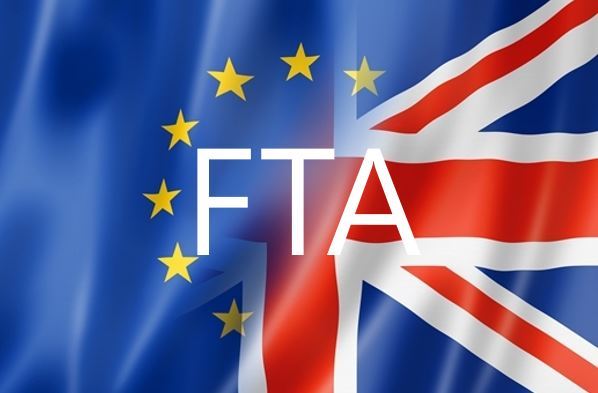[THE INVESTOR] South Korea is ramping up its negotiations on free trade agreements to tackle the economic confusion from Brexit, scouting for new markets and making sure it is part of numerous regional pacts, officials said July 4.
After signing its first FTA in 2004 with Chile, South Korea now has agreements with 52 countries through 15 agreements. Officials say unlike last year when the focus was on bilateral deals, this year it will be on multilateral deals.
The foremost target is concluding the Regional Comprehensive Economic Partnership within this year. The 10 member states of the Association of Southeast Asian Nations and six countries with which it has FTAs -- South Korea, China, Japan, Australia, New Zealand and India -- have held 13 rounds of talks and three more meetings at the ministerial level to thrust the agreement forward.

A completed RCEP would open up a market that was sized at US$22.6 trillion in 2014.
“A concluded RCEP would create a No. 2 mega FTA bloc,” Yeo Han-koo, South Korea’s top FTA negotiator, said. “South Korean companies will gain growth momentum through a bigger market and wider regions for investment, allowing them to link with competitive global values.”
The government estimates that South Korea’s real gross domestic product will increase 1.21-1.76 percent over 10 years.
The latest talks for a trilateral FTA with China and Japan were held in Seoul last week, keeping alive negotiations that started in March 2013. The three nations have met 10 times so far, honing in on market access for products and services. South Koreans officials say the three-way FTA will help solidify the economic link in Northeast Asia and eventually become the base for a wider economic unity for East Asia.
The estimate for this FTA is 1.17-1.45 percent increase in real GDP for South Korea.
The Trans-Pacific Partnership, projected to become the world’s largest economic bloc with a value of $28.1 trillion, is an attractive option for South Korea, not only because of its sheer size but also the 95-100 percent tariff exemptions for member states. Sensitive issues, including rules in operations of state-run corporations and fishing industry subsidies, are holding South Korea back from jumping into the talks, but officials say they are closely following how the deal is progressing.
South Korea is advancing into new emerging markets through trade agreements.
The pact with Colombia will take effect on July 15, three years and five months after it was signed, to remove tariffs on most of the products traded between the two countries within 10 years.
South Korea’s exports of autos, petrochemicals and cosmetics are expected to greatly benefit.
An FTA with a bloc of Central and South American nations is in the works, covering Panama, Costa Rica, Guatemala, Honduras, El Salvador and Nicaragua. Formal talks began in June last year, followed by five rounds of negotiations so far. This particular FTA would open up opportunities for South Korean firms to participate in infrastructure projects of partner countries, who are not parties to the Government Procurement Agreement.
At the bilateral level, South Korea is in negotiations with Ecuador since August last year. Talks with Mexico, which had stopped in 2008, are scheduled to resume later this year.
Talks with Israel were held in Seoul last week. With India, South Korea is planning to update the existing Comprehensive Economic Partnership Agreement, in effect since January 2010, for wider market access.
(theinvestor@heraldcorp.com)
After signing its first FTA in 2004 with Chile, South Korea now has agreements with 52 countries through 15 agreements. Officials say unlike last year when the focus was on bilateral deals, this year it will be on multilateral deals.
The foremost target is concluding the Regional Comprehensive Economic Partnership within this year. The 10 member states of the Association of Southeast Asian Nations and six countries with which it has FTAs -- South Korea, China, Japan, Australia, New Zealand and India -- have held 13 rounds of talks and three more meetings at the ministerial level to thrust the agreement forward.

A completed RCEP would open up a market that was sized at US$22.6 trillion in 2014.
“A concluded RCEP would create a No. 2 mega FTA bloc,” Yeo Han-koo, South Korea’s top FTA negotiator, said. “South Korean companies will gain growth momentum through a bigger market and wider regions for investment, allowing them to link with competitive global values.”
The government estimates that South Korea’s real gross domestic product will increase 1.21-1.76 percent over 10 years.
The latest talks for a trilateral FTA with China and Japan were held in Seoul last week, keeping alive negotiations that started in March 2013. The three nations have met 10 times so far, honing in on market access for products and services. South Koreans officials say the three-way FTA will help solidify the economic link in Northeast Asia and eventually become the base for a wider economic unity for East Asia.
The estimate for this FTA is 1.17-1.45 percent increase in real GDP for South Korea.
The Trans-Pacific Partnership, projected to become the world’s largest economic bloc with a value of $28.1 trillion, is an attractive option for South Korea, not only because of its sheer size but also the 95-100 percent tariff exemptions for member states. Sensitive issues, including rules in operations of state-run corporations and fishing industry subsidies, are holding South Korea back from jumping into the talks, but officials say they are closely following how the deal is progressing.
South Korea is advancing into new emerging markets through trade agreements.
The pact with Colombia will take effect on July 15, three years and five months after it was signed, to remove tariffs on most of the products traded between the two countries within 10 years.
South Korea’s exports of autos, petrochemicals and cosmetics are expected to greatly benefit.
An FTA with a bloc of Central and South American nations is in the works, covering Panama, Costa Rica, Guatemala, Honduras, El Salvador and Nicaragua. Formal talks began in June last year, followed by five rounds of negotiations so far. This particular FTA would open up opportunities for South Korean firms to participate in infrastructure projects of partner countries, who are not parties to the Government Procurement Agreement.
At the bilateral level, South Korea is in negotiations with Ecuador since August last year. Talks with Mexico, which had stopped in 2008, are scheduled to resume later this year.
Talks with Israel were held in Seoul last week. With India, South Korea is planning to update the existing Comprehensive Economic Partnership Agreement, in effect since January 2010, for wider market access.
(theinvestor@heraldcorp.com)







![[KH Explains] How should Korea adjust its trade defenses against Chinese EVs?](http://res.heraldm.com/phpwas/restmb_idxmake.php?idx=644&simg=/content/image/2024/04/15/20240415050562_0.jpg&u=20240415144419)










